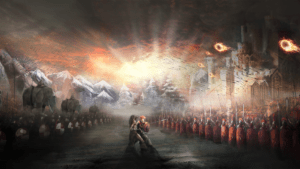Worldview Composition
A comprehensive and well-thought-out worldview must address twelve topics about reality, including:1
1) Theology / Concept of God / Ultimate Reality: What kind of God, if any, actually exists?
2) Metaphysics / External Reality: Is there anything beyond the physical cosmos?
3) Epistemology / Knowledge: What can be known, and how can anyone know it?
4) Ontology / Origins: Where did everything come from?
5) Anthropology / Psychology / Humanity: Who am I? What makes me human?
6) Location: Where am I?
7) Axiology (Morals): How should I live?
8) Axiology (Values): What should I consider of great worth?
9) Predicament: What is humanity’s fundamental problem?
10) Resolution: How can the problem be solved?
11) History (Past & Present): What is the meaning and direction of history?
12) Future / Destiny: Will I survive the death of my body, and if so, in what state?
Outlining the Christian Worldview
While brevity precludes a comprehensive articulation of the Christian worldview, the following serves as a general framework, describing the basic principles of Christianity, without exhaustively developing the particular doctrines. This outline will offer a foundation for personal worldview development, future analysis, and worldview comparison.
Theology / Concept of God / Ultimate Reality
Metaphysics / External Reality / Ontology
God created the heavens (i.e., metaphysical aspects of reality) and the material universe (i.e., physical aspects of reality) ex nihilo. Accordingly, God remains distinct from His creation, yet He actively preserves and governs the existence and operation of all creatures (i.e., divine providence) via His omniscience, omnipotence, and omniscience.4
Epistemology / Knowledge
Objective truth exists, and authentic knowledge of God, self, and creation are available through general and special revelation.5
Anthropology / Psychology / Humanity
Axiology / Ethics / Morality
Absolute, objective, self-evident, and transcendent moral values exist, which receive foundation from God’s perfect and immutable moral character.8
History (Past, Present, and Future)
History progresses in a linear direction and events unfold according to God’s sovereign will (both efficacious and permissive). Major events within human history include:
1) Past: Creation (cf. Genesis 1-2).
2) Past & Present: Fall (cf. Genesis 3).
3) Past & Present: Redemption (cf. Psalm 111:9; 130:7; Isaiah 59:1; 1 Corinthians 1:30; Ephesians 1:7; Colossians 1:14; Hebrews 9:12).
4) Future: Glorification (cf. Romans 8:30; 2 Thessalonians 1:10).
5) Future: New Creation (cf. Isaiah 65:17; 66:22; 2 Peter 3:13; Revelation 21:1-2).
Predicament
Humanity’s fundamental problem is sin. God declares His original creation is “very good,” (cf. Genesis 1:31), yet the first humans (Adam and Eve) misuse their free will to rebel against God (cf. Genesis 3). From this point forward, humanity becomes plagued with a natural inclination toward sin, producing detrimental ramifications for the creation (i.e., the introduction and perpetuation of natural and moral evil). Since all have transgressed God’s objective moral law, everyone will stand guilty before a virtuous God at the final judgment.9
Resolution
Not desiring that anyone should perish (cf. 2 Peter 3:9), God executes a divine plan of redemption. Through the sacrificial atonement of Jesus, God provides humanity with a means to escape this detrimental condition (cf. John 3:16-17). Those who accept God’s grace—trusting in Jesus’ salvific work—are declared righteous, while those who reject Jesus remain condemned for their transgressions (cf. John 3:18; 12:48-50).
Destiny
Upon physical death, the human soul endures temporary separation from the body (cf. Ecclesiastes 12:7; Luke 16:19-31), and at the resurrection, each person is reunited with their body (cf. John 5:29). The Christian will be glorified and enjoy God’s recreation, where they will reign and rule with Christ, while the unrighteous will endure eternal punishment in hell.10
- Kenneth Richard Samples, A World of Difference: Putting Christian Truth-Claims to the Worldview Test (Michigan: Baker Books, 2007), 21-28.
- Monotheism receives affirmation in Deuteronomy 4:35; 4:39; 6:4; 32:39; 2 Samuel 7:22; 1 Kings 8:60; 2 Kings 5:15; 19:15; 1 Chronicles 17:20; Nehemiah 9:6; Psalm 86:10; Isaiah 37:16; 37:20; 43:10-11; 44:6-8; 45:21; 46:9; Hosea 13:4; Joel 2:27; Zechariah 14:9; Mark 12:29-34; John 17:3; Romans 3:30; 1 Corinthians 8:4-6; Galatians 3:20; Ephesians 4:6; 1 Timothy 1:17; 2:5; James 2:19.
Trinitarian doctrine exceeds the scope of this outline; however, four basic premises comprise the doctrine:
“1. That God is one, and that there is but one God (Deut. 6:4; 1 Kings 8:60; Isa. 44:6; Mark 12:29, 32; John 10:30).
2. That the Father is a distinct divine Person (hypostasis, subsistentia, persona, suppositum intellectuale), distinct from the Son and the Holy Spirit.
3. That Jesus Christ was truly God, and yet was a Person distinct from the Father and the Holy Spirit.
4. That the Holy Spirit is also a distinct divine Person.”
See M. G. Easton, "Trinity," Easton’s Bible Dictionary (New York: Harper & Brothers, 1893).
Although the Bible does not explicitly teach this combination of assertions, “it may, nevertheless, be claimed that the doctrine of the Trinity is a profoundly appropriate interpretation of the biblical witness to God in the light of the ministry, death and resurrection-exaltation of Jesus—the ‘Christ event.’” See M. Turner and G McFarlane, “Trinity,” ed. D. R. W. Wood et al., New Bible Dictionary (Leicester, England; Downers Grove, IL: InterVarsity Press, 1996), 1209.
- Aseity and eternality (cf. Genesis 1:1; 21:33; Isiah 57:13; 41:4; 1 Timothy 1:17; Psalm 90:2; John 1:1-3; Revelation 1:8; 4:11; 22:13); infinity (cf. Job 11:7-9); omnipotence (cf. Isiah 43:13; 2 Corinthians 6:18; Revelation 1:8; 4:8; 11:17; 15:3; 16:7, 14; 19:6; 19:15; 21:22); omnipresence (cf. Psalm 139:7-8; Jeremiah 23:23-24; 1 Kings 8:27; 2 Chronicles 2:6); immutability (cf. Malachi 3:6; Psalm 102:25-27; James 1:17; Numbers 23:19; 1 Samuel 15:29; Hebrews 6:17); omniscience (cf. 1 John 3:20; Psalm 94:11; 139:1-16; Proverbs 3:19; Romans 11:33-36; Ezekiel 11:5; Isaiah 46:10); holiness and righteousness (cf. Isaiah 6:3; 43:15; 57:15; 60:14; Exodus 15:11; Psalm 11:7; 35:5; 37:28; 89:18; 89:35; 99:4; 145:17; Amos 4:2; Jerimiah 44:4; 50:29; Job 6:10; Hebrews 1:13; Revelation 4:8; 15:4); goodness (cf. Exodus 33:19; Psalm 16:2; 31:19; 119:68; 145:8-9; 103:8; Jeremiah 31:14; Hosea 3:5; 1 John 4:8; Zephaniah 3:17); and truth (cf. Numbers 23:19; 1 Peter 1:25; Psalm 100:5; 145:18; Matthew 5:18; Hebrews 10:23; 6:17-18; 2 Timothy 2:13; John 1:17; 9:42-47; 17:17; 18:37; 1 Peter 1:22; Deuteronomy 32:4; Isaiah 65:16).
- The notion of God’s spontaneous creation receives affirmation in Genesis 1:1. The doctrine of divine providence receives predication from Hebrews 1:3; Acts 17:28; Proverbs 16:33; Psalm 104:14; 135:5-7; 147:8-15; Matthew 6:26; 10:29.
- General revelation (cf. Psalm 19:1-2; Romans 1:19-20). Special revelation (cf. Hebrews 1:1-2).
- For more on human freedom, “Battle of the Will: Waging War Against Determinism.”
- Cf. Genesis 2:7; Matthew 10:28; 1 Corinthians 5:3; Romans 12:1; 1 Peter 1:9.
- Cf. Romans 3:23; 1 John 1:5; Exodus 20:1-17; Romans 2:12-16; 8:7; 9:27; Jeremiah 31:33; Hebrews 10:16; Matthew 5:48; 25:31-46; Revelation 20:11-15.
- Cf. Romans 3:10-12; Ecclesiastes 7:20; Psalm 14:1-3; 53:1-3; Hebrews 9:27; Romans 14:10-12; 2 Corinthians 5:10; 1 Peter 4:5.
- Christian destiny (cf. 2 Timothy 2:11-12; 1 Corinthians 6:3; Genesis 1:26–31). Eternal punishment of the unrighteous (cf. Matthew 13:41-42; 13:50; 25:46; Mark 9:43; Jude 1:7; 2 Thessalonians 1:9; Revelation 20:13-14; 21:8).




